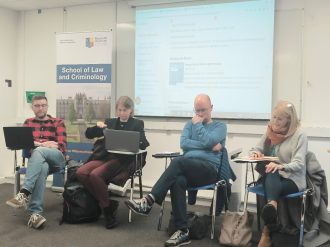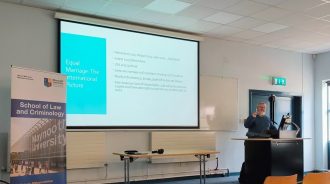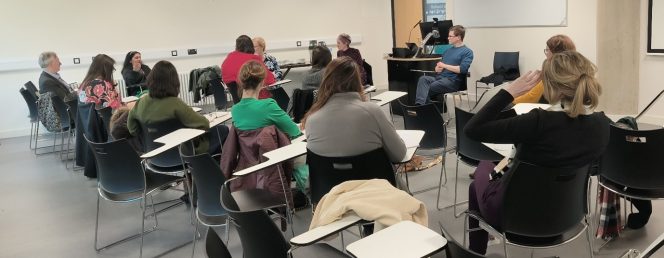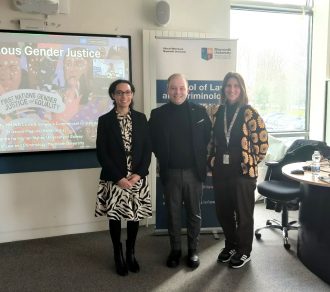Maynooth University (MU) Social Justice Week 2024 took place on the 4th – 8th March across the University, and the School of Law and Criminology hosted several events highlighting the vast knowledge and expertise in diverse areas of public interest and social justice in the School.
On Monday 4th March, MU hosted a roundtable event with Dr John Morrison, Dr Clíodhna Murphy, Dr Charles O’Sullivan, moderated by Professor Claire Hamilton on the ‘Perspectives on the Far-right in Ireland’. Each of the speakers briefly discussed their perspectives on the emergence of the radical right in Ireland followed by some Questions and Answers.

On Wednesday 6th March MU’s Head of School Dr Fergus Ryan hosted a workshop on “LGBTQ+ rights in a Global Context: Spotlight on India”. This workshop will took place as part of the Gender, Sexuality and Law module offered by the School.

On the same day, Dr Ollie Bartlett hosted an interactive workshop that discussed whether the Online Safety Code being developed by Coimisiún na Meán will sufficiently protect children’s rights. Organised in collaboration with the Irish Heart Foundation and the Children’s Rights Alliance as part of Maynooth University’s Social Justice Week. Ollie welcomed Kathryn Reilly, Policy and Legislative Affairs Manager, Irish Heart Foundation, Noeline Blackwell, Online Safety Co-ordinator, Children’s Rights Alliance and Dr Sheila Gilheany, CEO, Alcohol Action Ireland as speakers at the workshop which was aimed at policy advocates, academics, students, and anyone else with an interest in this topic. The workshop considered strategies for future advocacy, and share information and good practice for work on this important issue.
The interactive workshop invited participants to consider how the safety and health of children should be protected when they participate in the online community. The Online Media and Safety Regulation Act 2022 created a new media regulator for Ireland, Coimisiún na Meán, which has responsibility for adopting legally binding codes to regulate online platforms and activity for the protection of citizens. The proposed Online Safety Code for Video Sharing Platform Services has been criticised for not being sufficiently inclusive of the range of harms that children are exposed to and endangered by when they go online. In particular, commercial communications for alcohol, unhealthy food, and breast milk substitutes receive weak treatment despite the proven role of this content in encourage harmful behaviours in children. There is concern among children’s rights advocates that children may be or feel excluded from safe participation in the online world if they cannot be afforded crucial protections that will allow them to participate in ways that promote their healthy development. This interactive workshop encouraged participants to engage with leading experts on this subject to identify the ways in which children might be at risk when they go online, and how these risks will impact upon children’s ability to belong safely to the online community.

Finally on Thursday 7th March MU hosted Dr Gerard Maguire (Lecturer, Irish Centre for Human Rights and the School of Law and Criminology, Maynooth University) for a hybrid event where he presented a keynote entitled, ‘Indigenous Gender Justice Two-Spirit Identity, MMIWG Crisis, and Canada’s Commitment to UNSDG 5’ that sought to delve into the positioning of gender within Indigenous life.

About Maynooth University
Maynooth University is a constituent university of the National University of Ireland. It is located in Maynooth, County Kildare, Ireland. It is Ireland’s youngest university, having been founded by the Universities Act, 1997 from the secular faculties of the now separate St Patrick’s College, Maynooth, which was founded in 1795.
Maynooth University’s Department of Adult and Community Education (DACE) is the only specialist academic department for the education of adults in Ireland. We have been working with adults for 40 years. In that time we have worked with thousands of people who are living proof that one is never too old to learn. We have a range of courses designed to cater to the needs and wants of people from all walks of life and all educational backgrounds; from people who left school with no formal qualifications and are seeking to re-enter formal education; to those who have completed degrees and post-graduate degrees to doctorate level programmes and who are seeking Continuing Professional Development and Improved Practice.
More than anything else students who have undertaken our courses comment on the transformative nature of the discipline. Adult Education is a powerful tool for personal, organisational and societal change. Some of the methods used include small group discussion based learning where students are encouraged to engage with the subject or a problem by bringing the full extent of their own knowledge and experience to deepen the level of critical analysis. Skilled Adult Education facilitators accompany the group learning process and guide the students towards better understanding their own life world through promoting individual personal reflection. And so Adult Education creates dynamic learning environments in which participation is a key ingredient for exploring real life issues regarding human relationships, social and political issues in terms of social justice, equality, democracy and diversity.
DACE has a long tradition and commitment of providing and developing a wide range of courses both On Campus and at local level. Over the years our Continuing Education programme has grown and developed in response to the changing needs of adult learners. The role of continuing education courses is to provide third level learning opportunities for adults, which are flexible and part-time. Some, such as our Return to Learning courses, are designed particularly for those without previous third level education but who are considering re-entering education at this time of their life or their career. Others answer more direct needs of the individual and society such as our Addiction Studies or Community Development and Leadership courses. Our Training and Continuing Education certificate (Level 7) has become widely recognised as the Train the Trainer course par excellence. All of our courses are underpinned by a belief that adults learn best when the learning and courses are meaningful, relevant, accessible and applicable.
Wherever you start you will find that there are paths to progression onto other courses across a wide variety of academic disciplines. So whether you are looking to increase your career prospects by gaining a university qualification or you are just curious about the world in which we live, we’ve got just the course to capture your imagination!











